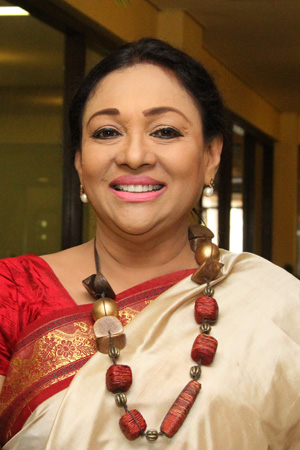Columns
Geetha being screened before Parliament role
View(s): She was at one time heart throb of the Sinhala cinema and described by her fans as the glam girl of the silver screen of yesteryear.
She was at one time heart throb of the Sinhala cinema and described by her fans as the glam girl of the silver screen of yesteryear.
She plunged into the world of politics from the cinema world and just two weeks ago, voters in the Galle District decided that she should become an Honourable Member of Parliament by electing Geetha Kumarasinghe on the UPFA ticket.
Yet, the road to the Parliament complex in the middle of Diyawanna Oya is not a smooth one for her. By her own admission, she was a dual citizen. The 19th Amendment to the Constitution prohibits a “Citizen of Sri Lanka who is also a citizen of any other country” from contesting the elections.
In an interview with a state run newspaper last year, when she was contesting the Southern Provincial Council elections, Ms. Kumarasinghe was asked whether she had the capacity to become chief minister. Her reply:
“What are the qualifications I lack compared to those who have become chief ministers in the provinces? I have seen the world. I am capable of addressing any international forum and get assistance to improve our health sector. I can do many more things than those who have served as chief ministers. I have seen what is happening in developed countries such as Switzerland because I am a citizen of Switzerland.”
Ms. Kumarasinghe told the Sunday Times this week she had written to the Swiss Embassy in Colombo seeking to withdraw her dual citizenship, when the elections were declared in view of the 19th Amendment. However, she did not say whether the embassy had responded to her request.
Diplomatic sources said there was a ‘lengthy procedure’ involved when one wished to renounce Swiss citizenship and that “cannot be done by simply writing a letter.” These sources said the procedure was spelt out in the Swiss Government website. For example, if the citizenship was obtained after marriage, the consent of the spouse would have to be obtained.
Ms. Kumarasinghe declined to say whether there was confirmation of her renouncement of Swiss citizenship and whether there was a response to her claimed letter to the Embassy in Colombo. She was unable to say if merely writing a letter to the Embassy in fact meant renouncing her citizenship.
The 19th Amendment to the Constitution came into effect on May 15 this year. Nominations for the parliamentary elections closed on July 13.The Sunday Times asked Additional Elections Commissioner M.M. Mohamed, who also deals with legal matters, what the position was. He said:
“There is no provision (in the law) where we could have rejected a nomination on the grounds that a candidate was holding dual citizenship. We also have no powers to investigate whether a candidate had dual citizenship. Even after the elections there is no provision to refrain from gazetting the names of those who were elected. However, the matter could be brought up in court and it will give a ruling. Or the Secretary General of Parliament can decide whether such a person could sit or not.”
The local Returning Officer is reported to have said that he could not reject Ms. Kumarasinghe’s name from the UPFA list because though the 19th Amendment debarred a dual citizen from contesting, the enabling legislation was not introduced by way of an amendment to the Parliamentary Elections Law.
The candidate who got the most preference votes after Ms. Kumarasinghe on the same UPFA ticket, but lost at the August 17 parliamentary elections, was former Minister Piyasena Gamage.Another candidate who contested from the Matara District is also said to be a dual citizen. However, he lost and thus the question of him entering Parliament does not arise.
The UPFA meanwhile was making inquiries about one of its own members from the Kalutara District. He lost but is now tipped to be a Cabinet Minister.
 Work out rules; don’t keep media away from President
Work out rules; don’t keep media away from President
The media crowding outside homes and offices of newsmakers is common in all parts of the world.
So much so in developed countries, like for example the United States, a whole media corps is accommodated in the offices at the White House, the official residence of the US President.
Often, reporters and photojournalists throng outside the door of No 10 Downing Street, the official residence of the British Prime Minister whenever there are newsworthy engagements. After all, keeping the public including the world at large informed of such important developments is their job.
Dharmashri Bandara Ekanayaka, Senior Director of the Presidential Media Unit, has sent a different missive to media institutions. This is what he says:
“During the past few days it has been observed that the media have assembled outside the residence of President Maithripala Sirisena at Paget Road in Colombo 07 to obtain photographs or interviews from Members of Parliament who have been visiting the President.
“This has caused problems for the security personnel providing security to the President and the privacy of the President.
“Former Presidents had strengthened security opposite their official residences by closing the roads, but this President who follows a simple life style has not made any changes so that the public can continue to use the roads in the area.
“The President who highly respects media freedom requests me to inform media personnel to refrain from carrying out recordings in front of his residence.”
While in no way interfering with President Sirisena’s simple lifestyle, which the media would respect at all time, it would be incumbent on the security personnel to ensure Sri Lanka’s Head of State is not deprived of communicating his messages to the people of the country. That is by making the mistake of shutting out the media altogether.
The best way, like in other countries, is for the Presidential staff to formulate ground rules which will allow the media access without impinging on security or what is described as lifestyles or the privacy of the President and his neighbours. That is the answer.
Maldives in pepper sambol over Nasheed
In the best of meals, the maldive fish sambol is still relished at the dinner table — with pepper and salt to spice it up.
But the Maldivian government had other uses for pepper last week when supporters of imprisoned former President Mohammad Nasheed were blasted with pepper spray — but not maldive fish — as a new method of crowd control in the capital of Male.
“What’s next?” asked a Nasheed supporter. “Chillie powder?”
The UN Human Rights High Commissioner Zeid Ra’ad al-Hussein of Jordan expressed his deep concern to the Government of the Maldives after Mr. Nasheed was once again sent to prison last Sunday. “We had been encouraged by the Government’s earlier decision to move Mr. Nasheed to house arrest after widespread national and international criticism of the clearly flawed trial which resulted in him being sentenced to 13 years in jail in March this year,” the High Commissioner said.
But obviously there was a catch: Mr. Nasheed was suddenly transferred on Sunday night to the high-security prison on Maafushi Island.”We also understand that force, including pepper spray, was used against his supporters who gathered in the narrow alley around his residence to show their solidarity and protest against his renewed imprisonment,” the High Commissioner said.
The office of the High Commissioner has already conducted two missions to the Maldives in recent months to discuss these issues with the authorities, and had visited Mr. Nasheed both in jail and at his residence when he was under house arrest.
“The return of Mr. Nasheed to prison in our view constitutes a serious set-back to the human rights situation as well as to moves towards finding a political solution in the Maldives,” the High Commissioner said.
He has therefore urged the Government to consider former President Nasheed’s early release. “We also urge the review of pending criminal cases against several hundred opposition supporters in relation to the protests in recent months,” he said.
President may address UN in Sinhala – how about a little bit of Russian?
When President Maithripala Sirisena addresses the UN General Assembly on September 30, chances are he will speak in Sinhala — a tradition under which various heads of state or government speak in their native language (provided an English translation is distributed to all delegates and UN translators).
But no one is sure how fluent the President is in Russian — going back to the days in 1980 when he earned a Diploma in Political science at the Maxim Gorky Literature Institute in Russia, according to his bio data.The UN will be more than happy to see him, at least partly, address the General Assembly in Russian, one of six working languages of the world body — besides, English, Spanish, French, Chinese and Arabic.
Sinhala, unfortunately, is not. Nor for that matter is Hindi, which some Indian prime ministers are comfortable with when they address the General Assembly. Just after former President Mahinda Rajapaksa addressed the General Assembly in English a couple of years ago, the Maldivian President walked up to his seat, as tradition demands, to congratulate him on his speech and told him: “Mr President, the next time you should speak in Sinhala”.
“In-sha Allah,” said President Rajapaksa in the customary Arab response.
What’s the blooming secret here?
Those are secret accounts that cannot be subject to any audit and are utilised by the organisation concerned for national security reasons. Now comes the news that the former boss had used several lakhs of rupees on a matter that was in no way related to national security. Or if it was, then it could have only been to block a road.
The expenditure was on different kinds of flower pots. Some of them have been transported to Colombo headquarters from different places, say sleuths who are in the know. One of them said that the pots were occasionally transported to different places for different occasions but brought back. Money for transport was no issue. That was secret too.
Ex-minister’s family foundation funds Siriliya
A Cabinet Minister in the previous regime set up a foundation in his name with his own household staff as directors.
They raised donations from different businessmen including those in job agencies.
The Financial Crimes Investigation Unit (FCID) has discovered during investigations that two million rupees from this former Minister’s fund has been given to the Siriliya Saviya NGO.
Five-star bash for new minister
A Colombo five-star hotel has won the order to prepare refreshments for 500 guests who will take part in a reception at a key Ministry on Friday.
This is after the Minister concerned is sworn in and makes his first visit to the Ministry.
PBJ grilled on alleged tsunami fraud
The Special Crimes Investigations Unit of the police this week recorded statements from former Treasury Secretary P.B. Jayasundera relating to the probe on RADA.
The SIU is probing allegations that millions were channelled to this Reconstruction and Development Agency (RADA) for construction of houses in the North after the December 2004 tsunami.
Investigations have revealed that no houses have been constructed though this one time state organisation obtained millions of rupees for the purpose.


Leave a Reply
Post Comment